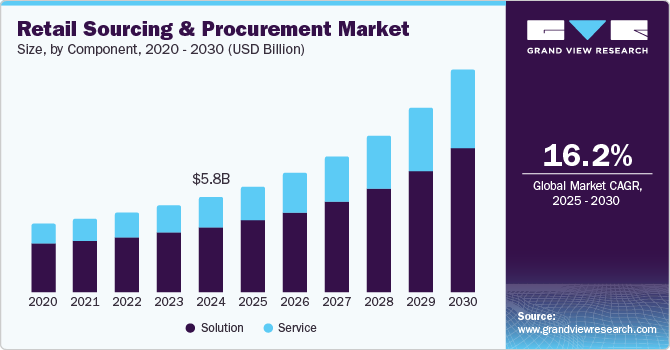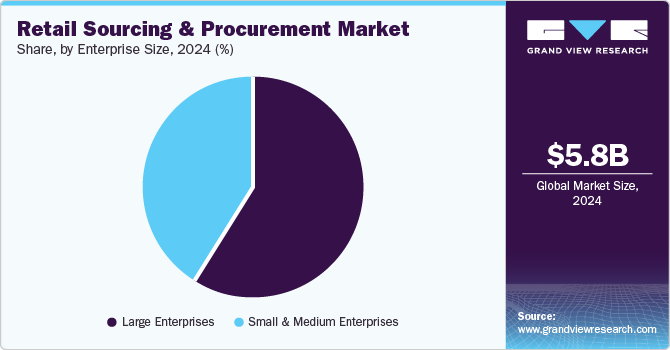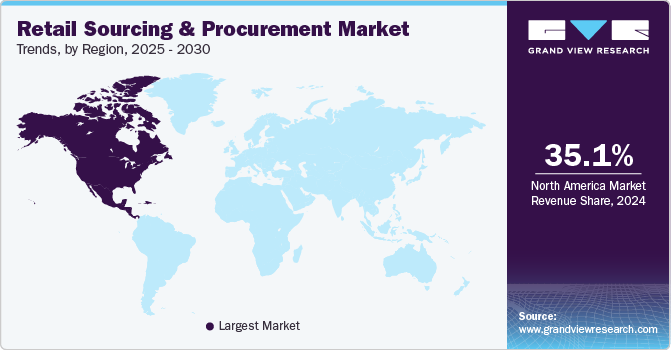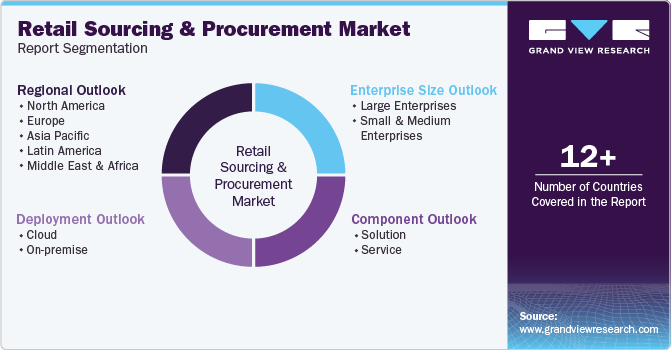
Retail Sourcing And Procurement Market Size, Share & Trends Analysis Report By Component (Solution, Service), By Deployment (Cloud, On-premise), By Enterprise Size, By Region, And Segment Forecasts, 2025 - 2030
- Report ID: GVR-2-68038-005-7
- Number of Report Pages: 100
- Format: PDF, Horizon Databook
- Historical Range: 2018 - 2023
- Forecast Period: 2025 - 2030
- Industry: Technology
Market Size & Trends
The global retail sourcing and procurement market size was valued at USD 5.82 billion in 2024 and is projected to grow at a CAGR of 16.2% from 2025 to 2030. Globally increasing adoption of the solutions by various retail businesses is anticipated to be the growth factor of the industry over the forecast period. Moreover, the emergence of the Internet of Things (IoT), cloud technology, and big data is the key factor in boosting the implementation of the solutions within businesses. Effective sourcing and procurement solutions help retailers identify cost-saving opportunities, such as bulk purchasing, supplier negotiations, and optimized inventory management.

The continued digital transformation in the retail sector has compelled retailers to demand solutions that automate manual processes, reduce errors, and enhance operational efficiency. Automation allows procurement teams to focus on strategic decision-making rather than routine tasks. The shift towards cloud technology in this industry has brought businesses flexibility, scalability, and cost savings. Cloud-based procurement solutions enable retailers to access data and tools from anywhere, improving collaboration and decision-making.
The role of artificial intelligence (AI) and machine learning technologies is also expected to define market expansion in the coming years. By leveraging AI capabilities, retailers can enhance their decision-making processes, improve efficiency, and respond more effectively to market dynamics. AI can analyze large datasets to evaluate suppliers based on criteria such as price, quality, delivery performance, and compliance with sustainability standards, enabling more efficient supplier assessment
The retail inventory management issue can also be addressed using AI-enabled solutions, as it can analyze inventory data to determine optimal stock levels, reducing excess inventory and associated carrying costs while ensuring adequate supply to meet demand. Such competitive advantages have compelled retailers to avail themselves of sourcing and procurement solutions that integrate AI. In May 2024, GEP announced the launch of an AI-based orchestration solution that automates procurement processes to improve collaboration, decision-making, and outcomes for businesses. Similar initiatives by other companies are expected to increase market competition and present more options for customers to select from. The increasing demand for sustainability has led retailers to demand solutions that enable them to source and track sustainability metrics responsibly. Stricter regulations related to sustainability and ethical sourcing are prompting retailers to invest in solutions that help ensure compliance and transparency in their supply chains. This is another important aspect that is expected to shape market growth during the forecast period.
Solution Insights
Based on components, the market has been categorized into solutions and services. The strategic sourcing sub-segment of solutions accounted for the largest revenue share of 25.8% in 2024. The rising demand for sourcing and procurement solutions in the retail industry and the increasing pace of technological advancements due to the extensive use of AI and machine learning are anticipated to maintain substantial demand for this segment. Strategic sourcing helps consolidate the purchasing power of the retail industry to ensure the best attainable value in the marketplace. These solutions help organizations analyze their procurement requirements and optimize their purchasing strategies to improve efficiency, reduce costs, and enhance supplier relationships. Unlike traditional sourcing methods that focus on transactional relationships and short-term price reductions, strategic sourcing involves a deeper analysis of an organization’s needs, supplier capabilities, market conditions, and overall supply chain dynamics, driving the demand for this solution.
The contract management segment is anticipated to witness the fastest growth during the forecast period. Contract management in retail sourcing is a critical component that focuses on effectively managing contracts related to procuring goods and services in the retail industry. The unique challenges in the retail sector, such as fluctuating demand, supplier variability, and stringent compliance requirements, have necessitated the presence of effective solutions that can help retailers optimize their sourcing strategies and ensure that they achieve the best possible outcomes. Furthermore, contract management tools ensure streamlined processes and the establishment of clear guidelines that lead to faster contract approvals and execution.
In terms of service, the implementation segment accounted for a leading revenue share in 2024. The growing need for advanced solutions in the retail industry that can result in better cost management and improved supplier and risk management while also addressing regulatory requirements drives the implementation of retail sourcing and procurement tools. This service involves several vital steps that can ensure that the deployed systems can meet the evolving demands of an organization, such as needs assessment and goal setting, stakeholder engagement, integration with existing systems, and customization & configuration. Growing competition in the industry has compelled service providers to offer efficient implementation services at competitive pricing, driving market growth through this segment.
The training and support service segment is expected to grow fastest from 2025 to 2030. Training and support are critical components of successfully implementing and maintaining retail sourcing and procurement solutions. Effective training ensures that all users are well-equipped to utilize the tools and processes effectively, while robust support helps address challenges that may arise post-implementation. Furthermore, continued upgrades in technology and the integration of innovative features in these solutions have necessitated continued upskilling of the involved stakeholders, leading to the steadily growing contribution of this segment.
Consulting services are expected to grow rapidly in the coming years. Retail purchasing is quickly evolving in response to advancements and changes in technology, hiring, and personnel requirements, business practices, and consumer demands and concerns. Big data will become a larger part of procurement and will assist in simplifying procurement decisions, form processes, and select suitable procurement solutions. Moreover, artificial intelligence and big data together will revolutionize the overall efficiency and speed of sourcing and procurement processes.
Deployment Insights
The cloud segment accounted for a significant revenue share in 2024 and is expected to advance rapidly during the forecast period. Cloud-based procurement helps streamline the overall source-to-pay process via social collaborations and automation, thus attaining higher margins by effectively controlling costs. Furthermore, the deployment of cloud-based software ensures seamless accessibility without the need for any additional IT solutions. Cloud-based procurement software also offers the advantage of timely upgrades and maintenance to ensure seamless functioning, driving its appeal among customers. The SAP S/4HANA is an enterprise resource planning (ERP) software developed for large enterprises by SAP SE that covers various processes such as procure-to-pay, order-to-cash, request-to-service, and plan-to-product, with its cloud edition being released semi-annually since 2022.
The on-premise segment is anticipated to advance at a substantial growth rate from 2025 to 2030. This segment witnesses strong demand, particularly among larger businesses that have the technological capabilities and capital to run these types of software from their location. On-premise systems are installed and operated on a retailer's servers and infrastructure rather than being hosted in the cloud. While cloud-based solutions have gained popularity for their scalability and flexibility, on-premise systems still offer unique advantages, such as enhanced security and data control, ease of customization, and reduced latency. Moreover, organizations with established on-premise systems can more easily integrate new procurement solutions with their existing infrastructure without relying on Internet connectivity. However, high initial investments and scalability limitations are challenges expected to restrain segment growth.
Enterprise Size Insights
The large enterprise segment accounted for a leading revenue share in the retail sourcing and procurement market in 2024. These businesses have extensively adopted innovative retail sourcing and procurement solutions to address the complexities and scale of procurement processes faced by organizations with extensive supply chains, diverse product offerings, and multiple locations. Consequently, they help streamline sourcing activities, improve supplier management, enhance cost control, and drive overall procurement efficiency. Growing need among such businesses to leverage their purchasing volume to negotiate better terms and pricing with suppliers and reduce procurement-related operational costs is a notable factor aiding industry expansion.

The small and medium enterprises segment is expected to witness the fastest CAGR from 2025 to 2030. The proliferation of SMEs across the retail sector and rising demand for the availability and timely delivery of products has forced these businesses to leverage sourcing and procurement tools to address the rising demand while maintaining profitable margin levels. These solutions help smaller businesses streamline their procurement processes, manage supplier relationships, and optimize costs without the extensive resources often available to larger corporations. Additionally, the use of automated processes speeds up the procurement cycle, allowing SMEs to respond quickly to market demands.
Regional Insights
North America led the market with 35.1% of the global revenue share in 2024. The demand for retail sourcing and procurement solutions in this region has been influenced by various factors, including the rapidly evolving retail landscape, supply chain complexities, technological advancements, and changing consumer behaviors. Retailers in economies such as the U.S. and Canada are continuously seeking ways to streamline procurement processes and reduce operational costs, driving substantial demand for solutions that automate sourcing, procurement, and supplier management. Additionally, the rapid growth of the e-commerce industry has led to increased demand for efficient sourcing and procurement processes. Retailers need to adapt quickly to changing consumer preferences and ensure that their supply chains can support online sales, driving market demand.

U.S. Retail Sourcing and Procurement Market Trends
The U.S. accounted for a dominant revenue share of the regional market in 2024 owing to the rapidly expanding adoption of automation in procurement and sourcing, coupled with frequent technological advancements in cloud and analytics. The country is known as a hub for innovations due to the presence of a highly competitive market, driving significant developments in technologies such as AI, machine learning, and blockchain, which have helped transform procurement processes.
Europe Retail Sourcing and Procurement Market Trends
Europe accounted for a notable revenue share of the global market in 2024. European retailers increasingly invest in digital sourcing and procurement solutions to enhance efficiency, transparency, and collaboration across their supply chains. Additionally, automation of procurement processes is a significant focus area for regional enterprises. The rising focus of European consumers on sustainability and ethical sourcing practices has compelled retailers to seek solutions that support sustainable procurement practices, track carbon footprints, and ensure compliance with environmental regulations.
Asia Pacific Retail Sourcing And Procurement Market Trends
Asia Pacific is anticipated to emerge as the fastest-growing market during the forecast period. The exponential growth of the retail industry in recent years in economies such as China, India, and Japan due to improving living standards and urbanization has created significant competition among businesses, driving demand for effective retail sourcing and procurement solutions. The steadily growing popularity of e-commerce has fundamentally changed how retailers operate, as they now require robust solutions to manage online sales efficiently, ensure product availability, and optimize logistics. The increasing adoption of omnichannel strategies among regional retailers has necessitated the presence of integrated procurement solutions that facilitate seamless product sourcing and inventory management across multiple sales channels.
The Indian retail sourcing and procurement market has witnessed strong growth in recent years, aided by the country’s continuously evolving economic environment, the rapid growth of the e-commerce industry, technological advancements, and increasing consumer awareness regarding sustainability. As retailers must address challenges and opportunities, they increasingly adopt advanced sourcing and procurement solutions that enhance efficiency, transparency, and responsiveness to market demands.
Key Retail Sourcing And Procurement Company Insights
Some key retail sourcing and procurement companies include Cegid, Epicor Software, and GEP.
-
Epicor Software specializes in developing enterprise software solutions, with its major offerings being in financial management, enterprise resource planning (ERP), manufacturing execution systems, human capital management, and supply chain management (SCM). Epicor offers cloud-based ERP solutions that provide flexibility, scalability, and reduced IT overhead for businesses. The company also develops solutions to streamline and enhance the processes of sourcing products, managing suppliers, and handling procurement activities.
-
GEP is a global provider of procurement and supply chain solutions, offering software and consulting services that are designed to optimize procurement processes and enhance supply chain management. GEP SMART is a unified source-to-pay procurement software platform that provides sourcing, contract management, supplier management, and procurement analytics in one integrated solution.
Key Retail Sourcing And Procurement Companies:
The following are the leading companies in the retail sourcing and procurement market. These companies collectively hold the largest market share and dictate industry trends.
- Cegid
- Epicor Software Corporation
- GEP
- Infor
- International Business Machines Corporation
- Ivalua Inc.
- Blue Yonder Group, Inc.
- Oracle
- Proactis Holdings Limited
- SAP SE
Recent Developments
-
In August 2024, Costa Coffee announced that it would leverage the GEP SOFTWARE procurement platform to automate its procurement process for the company’s global direct and indirect spending. The GEP SOFTWARE offers AI-enabled digital procurement and supply chain platforms to enable global enterprises to become more resilient, agile, competitive, and profitable.
-
In June 2024, Infor Nexus announced the launch of the ‘Map and Trace’ application, developed in partnership with Burton Snowboards, to efficiently map suppliers, their suppliers, and transactional records that support the chain of custody.
Retail Sourcing And Procurement Market Report Scope
|
Report Attribute |
Details |
|
Market size value in 2025 |
USD 6.47 billion |
|
Revenue Forecast in 2030 |
USD 13.69 billion |
|
Growth Rate |
CAGR of 16.2% from 2025 to 2030 |
|
Base year for estimation |
2024 |
|
Historical data |
2018 - 2023 |
|
Forecast period |
2025 - 2030 |
|
Quantitative units |
Revenue in USD million and CAGR from 2025 to 2030 |
|
Report Coverage |
Revenue forecast, company ranking, competitive landscape, growth factors, and trends |
|
Segments Covered |
Solution, service, deployment, enterprise size, region |
|
Regional scope |
North America, Europe, Asia Pacific, Latin America, MEA |
|
Country scope |
U.S., Canada, Mexico, Germany, UK, France, China, Japan, India, Australia, South Korea, Brazil, South Africa, Saudi Arabia, UAE |
|
Key companies profiled |
Cegid; Epicor Software Corporation; GEP; Infor; International Business Machines Corporation; Ivalua Inc.; Blue Yonder Group, Inc.; Oracle; Proactis Holdings Limited; SAP SE |
|
Customization scope |
Free report customization (equivalent up to 8 analysts working days) with purchase. Addition or alteration to country, regional & segment scope. |
|
Pricing and purchase options |
Avail customized purchase options to meet your exact research needs. Explore purchase options |
Global Retail Sourcing And Procurement Market Report Segmentation
This report forecasts revenue growth at the global, regional, and country levels and provides an analysis of the latest industry trends in each of the sub-segments from 2018 to 2030. For this study, Grand View Research has segmented the global retail sourcing and procurement market report based on component, deployment, enterprise size, and region.

-
Component Outlook (Revenue, USD Million, 2018 - 2030)
-
Solution
-
Strategic Sourcing
-
Supplier Management
-
Contract Management
-
Procure-to-pay
-
Spend Analysis
-
-
Service
-
Implementation
-
Consulting
-
Training & Support
-
-
-
Deployment Outlook (Revenue, USD Million, 2018 - 2030)
-
Cloud
-
On-premise
-
-
Enterprise Size Outlook (Revenue, USD Million, 2018 - 2030)
-
Large Enterprises
-
Small & Medium Enterprises
-
-
Regional Outlook (Revenue, USD Million, 2018 - 2030)
-
North America
-
U.S.
-
Canada
-
Mexico
-
-
Europe
-
UK
-
Germany
-
France
-
-
Asia Pacific
-
Japan
-
India
-
China
-
Australia
-
South Korea
-
-
Latin America
-
Brazil
-
-
Middle East & Africa
-
South Africa
-
Saudi Arabia
-
UAE
-
-
We are committed towards customer satisfaction, and quality service.
"The quality of research they have done for us has been excellent."




